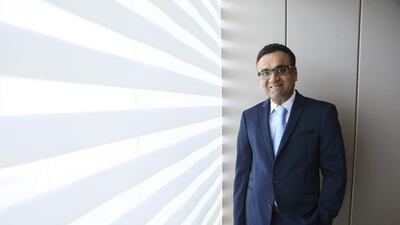Shailesh Jasani is a finance controller for the Dubai-based construction company Goldline Contracting. Mr Jasani, 46, has lived in the UAE for 22 years and is married with two sons, aged 18 and 15.
Describe your financial journey so far.
Growing up, every dollar was important and we were taught the principle of financial prudence. I left my village at the age of 15 to study and had to move to a city, and this made me learn how to manage money. I got my chartered accountants’ degree in 1992 in India, simultaneously with a master’s degree in commerce. I studied without any financial help, as all of my family members were in business. I had only two options available – either to join a business and start earning at 20, or find a way to pay for my education. When I passed my degree I was offered two jobs – I went for both, working as a part-time college lecturer and a full-time assistant finance manager. I left India in 1993 due to an economic slowdown and moved to the UAE. I landed with just Dh200 in my pocket. To earn my first million rupees took me four years. Now, after 22 years, I have a diversified portfolio spread across different asset classes.
Are you a spender or saver?
I am a saver. Typically, I keep my percentage of spending constrained, so that with a rise in income you can have a good lifestyle and still save more money in absolute terms. I believe a penny saved is a penny earned. Too many people spend money they haven’t earned, to buy things they don’t want and to impress people they don’t like.
What is your philosophy towards money?
More money does not necessarily buy more happiness, but less money is associated with emotional pain.
Have you made any financial mistakes along the way?
Any financial journey without mistakes becomes a myth. Yes, I didn’t take more risk during the financial crisis of 2009-10 after the collapse of Lehman Brothers when there were plenty of opportunities in local and global equities and real estate markets. A bit of leveraged investment would have given phenomenal returns. This taught me to buy the fear and sell the greed.
If you won Dh1 million, what would you do with it?
I would put aside a portion for needy people back home and invest the rest. I believe in investments that will multiply in a couple of years in emerging markets, but I would also put a portion into fixed income funds – and I would buy a new car.
What has been your best investment?
I bought land back in India which appreciated three times in five years and the only important thing was location, location and location. Since I handle some of the group chairman’s portfolio, we also bought shares in a bank that have grown in value 12 times in nine years. As [the book] Rich Dad, Poor Dad says, the rich do not work for money and sometimes fear and thinking with emotions leads to lost opportunities.
What is your most cherished purchase?
My first apartment in India 20 years ago. It cost US$32,000 but when you are starting out, it becomes memorable.
Where do you save your money?
I park a major portion of my earnings into bank fixed deposits and partly in equities on a systematic investment plan.
What financial advice would you offer your younger self?
Do what you feel is right and not what others say. Start investing at a young age into good asset classes, and take calculated risks.
What would you raid your savings account for?
Only for emergencies, or for my children’s education or family commitments.
mfahy@thenational.ae
Follow us on Twitter @TheNationalPF


